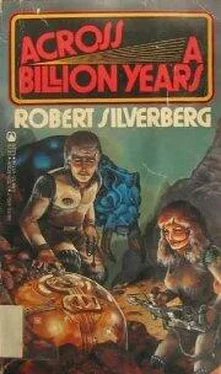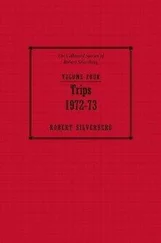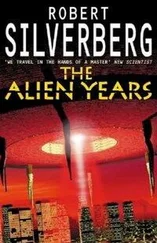We use landing pods instead of going down with the whole ship because it saves fuel. A landing pod has practically no mass, and these asteroids have practically no gravitational pull, and so it takes only the slightest kick to reach escape velocity. Why bother maneuvering a bulky ship into a landing orbit when a couple of explorers in pods can whisk down, look around, and whisk up again? Especially when we’re not sure we’ll find what we’re looking for.
Jan and I climbed into our breathing-suits and clumped ponderously down the corridor to the pod room. The pods were ready in the ejection chutes, lying down with their upper halves unhinged and pulled back. I got into my pod, Jan into hers, and Pilazinool and Steen swung the lids down on us. Miscellaneous clanking sounds told me that the pods were being sealed. A couple of thousand years ticked by. I used up some of the time by studying the control panel mounted just in front of my face. The round green knob would open the pod. The square red knob next to it would close it. The triangular black knob would bolt it. The long yellow lever to my right was a manual blast starter. The long white lever to my left was a steering rod.
They say that running a landing pod on manual is no harder than driving a car on manual. Maybe so. But the last time I drove a car on manual was when I qualified for my license, and I didn’t care much for the sensation; it spins me to think of whole nations of drivers, a couple of centuries ago, at loose on the road and supposed to drive their cars themselves, instead of letting the traffic-control computers do the job. And as I got into the landing pod I wasn’t too eager to have to pilot it back from the asteroid myself, either. Of course, I didn’t expect to have to. Ludwig runs the pods by remote from the ship. But if the telemetry line failed, somehow —
Anyway, they shot us down the chute and into space.
Jan’s pod went first. I followed her out of the ejector tube twenty seconds later. As I cleared the ship I felt a faint vibration near my shoulder blades: the ship computer was firing my nitrogen jets to insert the pod into the entry orbit Ludwig had programmed. I went hurtling feet-first toward the asteroid.
By leaning forward in the pod and peering down my nose and through my pod’s viewscreen, I caught a glimpse of the silvery tube that contained Jan, zipping along below me. Her velocity and mine were identical, so that we seemed held together by a chain; but the asteroid appeared to be coming up at us at a fantastic speed. Something’s wrong, I told myself. We’re traveling too fast. We’re going to smash into that asteroid like a couple of meteors. We’ll split the asteroid in half.
Right on schedule, my tail-jets started firing. The pod decelerated and floated neatly down to its planned impact point on the asteroid.
Landing was a gentle bump. Instantly the four landing-jacks sprang forth to anchor the pod. I waited about ten seconds to be certain the pod was stable; then I twisted hard on the round green knob. The pod popped open.
I stood in the middle of a grim, terrible landscape. No breeze had ever blown here; no drop of rain had ever fallen; no living thing, not even a microbe, had called this place home. To my left, the plain on which I had landed curved away swiftly to the foreshortened horizon; to my right and straight ahead there ran a range of hills that looked like shrunken mountains, sawtoothed and jagged. The surface of the land was bare: no plants, no soil, no ice, only raw rock, pockmarked by the meteor collisions of billions of years. I remember the first time I visited Luna, Lorie; I was twelve years old and had never imagined that any place could look so desolate. But Luna is a lovely garden, compared with this asteroid.
As I glanced around, I felt suddenly sure: this is the place! In my mind I played for the millionth time the sequence of the globe, saw the plain on which the ship of the High Ones had come down, saw the low hills, the craters, everything. Everything matched. The only thing missing was the pink glow on the flanks of the hills, the pale light of the white-dwarf sun. That sun, much closer to death now, gave forth only a trickle of purple illumination; it didn’t help me much, nor did the cold glitter of the stars. I switched on my helmet lamp.
Jan’s pod had come down about a thousand meters away, much closer to the hills. She was out of it and waiting for me. I waved; she waved back; and I started toward her. My first quick bound covered twenty meters.
Nick Ludwig’s voice said in my suit speakers, “Remember the grav!”
So he was monitoring me. I looked up and saluted. But I walked more carefully. With gravity so low on this asteroid, a really good leap might be enough to send me a few thousand meters out into space. In a stately way I caught up with Jan, and we touched helmets by way of greeting.
Then we went together toward the hills.
She was carrying the portable sonar; I had the neutrino magnetometer. We halted in a cup-shaped depression in the plain, close to the hills, and set up our equipment. Turning on the sonar, we swung it slowly in an arc across the horizon, bouncing sound waves off the hills until the scope told us of the hollow place we were looking for. We carefully recorded the position.
We moved closer to the hollow place. I’ll spare you all the thundering heartbeats and tense exchanges of knowing glances; let’s just say that Jan and I were edgy and excited as we switched the neutrino magnetometer on and began to scan the face of the hill. As I brought the scanning beam over the area of hollowness, the needle shot way up into the blue end of the spectrum. Metal!
“This is it,” I radioed calmly up to the ship. “We’ve got the vault right here!”
“How do you know?” Dr. Schein asked.
“I’m getting two different densities for this patch of the hill,” I said. “They must have camouflaged the vault door with laminated rock. I pick up about a one-meter thickness of rock, with a huge slab of metal just behind it.”
“And what’s behind the door?”
“Just a minute,” I said, adjusting the field of the scanner. Now the neutrino beam penetrated more deeply into the vault. The needle stayed on the blue; and as I moved the beam, the printout supplied me with a picture, in shadow-images, of the contents of the vault. It showed me the rear walls — dark, full of alien machinery — and the side walls, following the six-sided pattern of the globe sequence; and it revealed a dark, massive metal object sitting in the middle of the floor.
The robot.
“My flesh began to crawl with amazement,” it always says in the old horror stories. Until that moment I was never able to understand how flesh could crawl, but now I knew, for my flesh was crawling in all directions. I had seen a billion-year-old film show me the construction of this vault; and I had seen the robot of the High Ones take up its position on the floor, a billion years ago, when trilobites and jellyfish ruled Earth; and here I stood, pumping a neutrino beam into that vault and seeing the robot still occupying the same place, and I tell you, Lorie, I was awed right out of my snuff.
I described the scanner readings to those in the ship. My suit radio dimly brought me sounds of shouts and celebrations from up there.
“Don’t go anywhere,” Dr. Schein said. “We’re coming down!”
The ship shortly broke out of its parking orbit and went into an entry approach. Ludwig made a picture landing. The ship floated nicely down and settled smoothly in the nearby plain. Then the hatches opened and people came pouring out, and we held another festival of foolishness, dancing madly around the neutrino magnetometer.
Now all we have to do is get the vault open. That’s all.
* * *
December -30
Читать дальше












